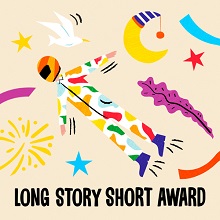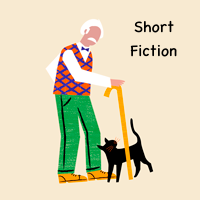First thing every day, I count out the same colorful cocktail of medications into Mother's four containers: morning, midday, evening meal and nighttime. Two pink pills shortly after waking up, and ... [+]
The library is more like a mausoleum, it’s so quiet. Not only is it early, it’s a Saturday over spring break. Stef has to ring the bell three times before she hears muffled footsteps in the backroom.
“We heard you,” the librarian drones, words dry and cracked as a desert’s crust. “Get your hand away from the bell, for Merlin’s sake.” Stef quickly lowers her hand to the table, shaking her bangs out of her eyes. The student emerging from the backroom is someone she’s never seen in the library before, plaid blazer wrinkled like he’d slept there overnight. His glasses have a honeycomb pattern—the kind that pretentious wizard honor societies give out as freebies—making him look like a hundred-eyed insect. A leathery iguana wearing an eyepatch rests on one of his slumped shoulders. “What do you need?”
Stef straightens. “I’m looking for a book on unethical transmogrification.” The fly in the girls’ locker room had seemed oddly cognizant of who was naked at what time.
“Oh, so it was you that left a message at the crack of dawn.”
It’s not a question, but Stef nods, and the worker rolls all of his insect eyes. The iguana’s unpatched eye does the same. The wizard ducks under the desk and returns to drop an index onto the table. Popping the clasp, he begins leafing through the entries—some written on preserved leaves, some on thin sheets of flint, some on notecards. He tugs out a square of glistening fabric and holds it up to the light, squinting at the embroidered letters. “It’s in the UV section, shade #238.”
“I can’t see that far.”
His eyes are piercing. “Excuse me?”
She scowls, ignoring the unease bubbling in her stomach. “I’m—What’s your name?”
A beat passes. “Theodore.” He practically spits the word. Stef only nods.
“Well Theodore, I’m human.” The wizard stiffens, and her words speed up. “I thought I mentioned this over the phone. So, would you mind leading me to the shade I’m looking for?” Theodore straightens, forcing the iguana on his shoulder to shift, its claws wrinkling the fabric. Stef swallows quietly.
“Human?” Theodore’s voice is coarser than before. Stef can usually ignore how creepy it is that magicfolk don’t need to blink, but right now she’s finding it very difficult. His eyes are a sharp, shattered grey, and the ink-dot pupils seem to have shrunk.
She forces a smile. “Yes.”
“One of the... non-magical things?” His twitchy fingers rumple the glossy fabric, knuckles whitening.
Things, he’d said. Stef’s smile stales. “Yes. Now, would you mind showing me where the book is?”
Theodore doesn’t react, glassy eyes swimming in deep thoughts, body motionless in the unnatural way that comes naturally to wizards.
The clock ticks.
The iguana licks its eyeball.
Theodore lifts a hand to his shoulder for the iguana to waddle onto, then lowers it to the desk. The iguana crawls down the side of the table and lands with a harsh plop on the tile. Before Stef can help the creature it’s up and scuttling, legs pumping as it darts down the grand aisle, sticky footprints catching the fluorescent light.
Theodore jerks his shoulder. “Follow her, then.” His eyes still refuse to blink as Stef nods and turns to trail the animal.
Stef convinces herself the exchange could’ve gone worse. She walks through the rainbow spectrum of shelved books, pressing down the lingering jitters. Her steps echo in the arched hallway, only accompanied by the soft click of the iguana’s claws.
At least Theodore hadn’t been wearing an anti-human political button, or demanded to know what a human thought it was doing at a magical university. WU had started accepting humans for diplomatic programs several years ago—a fact that a lot of magicfolk like to forget.
Stef scoffs. Purebreds.
The iguana stops at one of the last bookcases and shoots its tongue up, sticking it to a book’s spine on the third shelf. Stef gently removes the purple leather tome, shaking it lightly until the iguana’s tongue sling-shots back into its mouth.
The book is titled Vultus Carcera, after the spell that does the job. Oddly enough, the textbook looks recently-used, though she suspects that’s due to a nifty dusting spell. She cracks the book open to the section on how to recognize an unethically transmogrified human, finger trailing along the page before she begins to read.
“Humans are easier to transform than other sapiens. They’re usually transmogrified into teacups or other inanimate objects,” Stef whispers. The iguana licks its eyeball again. “In which case, they’ll transform back after a day or two.
“However, an especially talented witch or wizard may succeed in transforming a human into an animal, which can last for a much longer time. The human’s mental processes are stunted, leading to a convincing animal. They can be hard to recognize, but here’s how.” Stef lowers herself onto the floor, now finding the part she’s interested in.
“Forcing humans into animal bodies usually causes the skin to sag, as it’s rarely a perfect fit. The eyes are sometimes two separate colors, one belonging to the original animal and... the second to the human.”
Stef pauses. Slowly, she glances up at the iguana’s eyepatch.
Breath wavering, she dares herself to lift it—flip up the patch, just to check. Her throat constricts, arm feeling heavy as lead.
Just as her fingertips brush the patch, the hard tip of a wand digs into her nape.
“Vultus carcera.”



